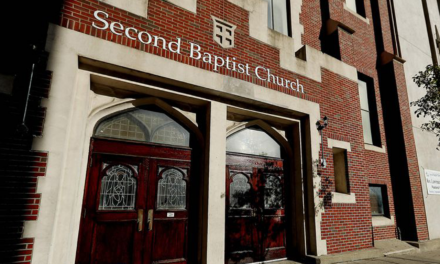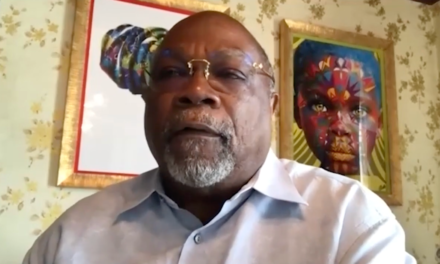In a new abortion ruling that has sent shockwaves through America, the U.S. Supreme Court has decided to reverse the landmark Roe V. Wade court case that provided comprehensive protection to women’s reproductive rights.
The Supreme Court’s overturning of Roe V. Wade has birthed new concerns within the medical community about how the new aborting ruling might affect the health of Black women, who statistically are three times more likely to die from pregnancy-related causes than their white counterparts.
In light of the Supreme Court’s decision to roll back women’s constitutional rights, American Black Journal host Stephen Henderson sits down with Dr. Kimberly Farrow, of Central City Integrated Health, for a conversation about the economic and health-related challenges Black women will not face under the new court ruling.
Plus, Dr. Farrow shares how overturning Roe V. Wade will affect Black women’s medical decisions and put them at greater risk than they already are.
Full Transcript:
Stephen Henderson: Start just by saying that, you know, whenever we talk about a stressful situation, a stressful health situation in this country, it means something different to African Americans than it does to everybody else. And I think in the wake of this ruling from the Supreme Court, we’re learning that abortion is no different. Abortion rights are no different. Talk about, though, why this issue looks different for African American women than it does for everybody else.
Dr. Kimberly Farrow, President & CEO, Central City Integrated Health: It’s such an important question. So, let me just bring this up a bit. In 2021, there were over 30,000 women that received abortions. Half of those women happened to be African American. So, this is an issue that greatly impacts African American women.
The decision to carry a pregnancy to term weighs heavily on the community. Often women have to grapple with financial issues, access to care issues, you know, whether they have adequate family support. And so, these are the things that we see African American women in our community really struggle with.
Stephen Henderson: So, that number that you just cited, that half of the people seeking abortions in 2021 were African American, of course, we are not half of the population. That’s a pronounced overrepresentation. And you talked about some of the reasons why, but it seems to me, that this fits into that larger context of poverty, of course, and access to health care as well. These are challenges that we face in every facet of health care. And so, abortion is again, not different.
Dr. Kimberly Farrow: Correct. I mean, our patients especially, you know, let’s talk about at-risk patient populations, brown and black community patients, they still struggle to access high-quality health care services. Transportation is the issue. Finding money to pay for medications still is an issue. You know, many of our patients struggle with chronic disease, so you’re talking about mental health struggles, you’re talking about physical health struggles. And so, all these things, again, play into these decisions, right? You know, am I able to carry a pregnancy to term?
Now, I think what really also needs to be said, that if Michigan’s 1931 statute that makes providing an abortion a felony, where will patients receive care? Because really what’s happened here, it’s not that the overturning Roe V. Wade has stopped abortions, it has stopped access to abortions, to safe abortions. So, what happens when our patient population, who already struggles with accessing care, now has to potentially cross state lines to receive the care that they need?
I mean, you know, I shudder to think, are we going to be returning to, you know, back-alley procedures in dark rooms with, you know, with no medical professional in sight? I don’t know. But these are the things that the medical community is very, very concerned about.
Stephen Henderson: When we think about the current state of the law, I think we should also be clear about what it is, because there is some argument about whether that 1931 law is now in effect in Michigan or not. There is an injunction against it, though, and we should be clear; people who need this medical service can still get it. They can still get it legally. They can still get it safely.
Dr. Kimberly Farrow: Currently, correct. That is absolutely correct. So, you know, right now there is an injunction, as you stated, and I know that it’s being challenged right now in the state courts. I know that Governor Whitmer has issued her statement really asking the Supreme Court to expedite their decision. So, you know, I guess we’re in a holding pattern; in a wait-to-see pattern right now.
Stephen Henderson: The other thing I’d love to hear you talk with our viewers about is, I guess the rich diversity of reasons and circumstances that lead people to want to end a pregnancy. I think there’s a real stereotype about who has to seek this kind of medical attention. Talk about the kinds of things that you see and experience.
Dr. Kimberly Farrow: I’m glad you asked that question. I think it’s such a powerful question because I think often the assumption is that these are decisions that are kind of, you know, willy-nilly decisions that weren’t very thoughtful. Our patients that seek to not continue a pregnancy to term often are challenged with mental health issues that, you know, really are overwhelming for them and are not, in their minds, compatible with carrying a pregnancy to term.
Many of our patients are impoverished, meaning that they don’t have support systems, they don’t have financial stability, they have limited education. And so, bringing a child into that situation for them is, you know, overwhelming and not a decision that they want to make. Many of our patients have chronic health problems, you know, that will make it very difficult for them to continue a pregnancy. Some of these decisions are made out of having found themselves pregnant as a result of rape or incest.
These are serious, serious challenges and situations that our patients find themselves in and the decision to not carry a pregnancy to term weighs heavily on them. So, you know, I’m glad you asked that because I think often, again, it’s perceived that people are just kind of irresponsible or thoughtless and that’s not what we’re seeing in the medical community. These are people who are trying to do what’s best for them and their families and to make healthy decisions for themselves.
Stephen Henderson: Yeah. And that relationship between the physician and the patient, it is everything in this circumstance. And it is private, it’s intimate, it really is about medical care and nothing else.
Dr. Kimberly Farrow: You know, irrespective of how we personally feel about abortion, health decisions, reproductive health and rights, not politics, really should be leading these decisions.
Stay Connected:
Subscribe to Detroit Public Television’s YouTube Channel & Don’t miss American Black Journal on Tuesday at 7:30 p.m and Sunday at 9:30 a.m. on Detroit Public TV, WTVS-Channel 56.
Catch the daily conversations on our website, Facebook, Twitter and Instagram @amblackjournal.
View Past Episodes >
Watch American Black Journal on Tuesday at 7:30 p.m. and Sunday at 9:30 a.m. on Detroit Public TV, WTVS-Channel 56.




